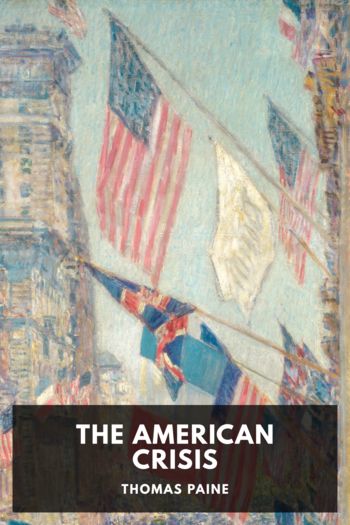The American Crisis, Thomas Paine [pdf to ebook reader TXT] 📗

- Author: Thomas Paine
Book online «The American Crisis, Thomas Paine [pdf to ebook reader TXT] 📗». Author Thomas Paine
I now pass on to show the value of the present taxes, and compare them with the annual expense; but this I shall preface with a few explanatory remarks.
There are two distinct things which make the payment of taxes difficult; the one is the large and real value of the sum to be paid, and the other is the scarcity of the thing in which the payment is to be made; and although these appear to be one and the same, they are in several instances riot only different, but the difficulty springs from different causes.
Suppose a tax to be laid equal to one half of what a man’s yearly income is, such a tax could not be paid, because the property could not be spared; and on the other hand, suppose a very trifling tax was laid, to be collected in pearls, such a tax likewise could not be paid, because they could not be had. Now any person may see that these are distinct cases, and the latter of them is a representation of our own.
That the difficulty cannot proceed from the former, that is, from the real value or weight of the tax, is evident at the first view to any person who will consider it.
The amount of the quota of taxes for this State for the year, 1780, (and so in proportion for every other State,) is twenty millions of dollars, which at seventy for one,45 is but sixty-four thousand two hundred and eighty pounds three shillings sterling, and on an average, is no more than three shillings and five pence sterling per head, per annum, per man, woman and child, or threepence two-fifths per head per month. Now here is a clear, positive fact, that cannot be contradicted, and which proves that the difficulty cannot be in the weight of the tax, for in itself it is a trifle, and far from being adequate to our quota of the expense of the war. The quit-rents of one penny sterling per acre on only one half of the state, come to upwards of fifty thousand pounds, which is almost as much as all the taxes of the present year, and as those quit-rents made no part of the taxes then paid, and are now discontinued, the quantity of money drawn for public-service this year, exclusive of the militia fines, which I shall take notice of in the process of this work, is less than what was paid and payable in any year preceding the revolution, and since the last war; what I mean is, that the quit-rents and taxes taken together came to a larger sum then, than the present taxes without the quit-rents do now.
My intention by these arguments and calculations is to place the difficulty to the right cause, and show that it does not proceed from the weight or worth of the tax, but from the scarcity of the medium in which it is paid; and to illustrate this point still further, I shall now show, that if the tax of twenty millions of dollars was of four times the real value it now is, or nearly so, which would be about two hundred and fifty thousand pounds sterling, and would be our full quota, this sum would have been raised with more ease, and have been less felt, than the present sum of only sixty-four thousand two hundred and eighty pounds.
The convenience or inconvenience of paying a tax in money arises from the quantity of money that can be spared out of trade.
When the emissions stopped, the continent was left in possession of two hundred millions of dollars, perhaps as equally dispersed as it was possible for trade to do it. And as no more was to be issued, the rise or fall of prices could neither increase nor diminish the quantity. It therefore remained the same through all the fluctuations of trade and exchange.
Now had the exchange stood at twenty for one, which was the rate Congress calculated upon when they arranged the quota of the several states, the latter end of last year, trade would have been carried on for nearly four times less money than it is now, and consequently the twenty millions would have been spared with much greater ease, and when collected would have been of almost four times the value that they now are. And on the other hand, was the depreciation to be ninety or





Comments (0)